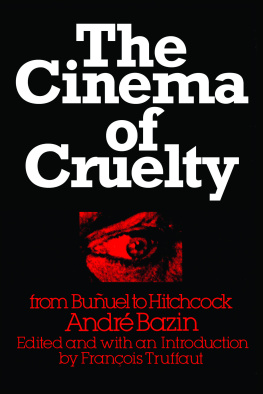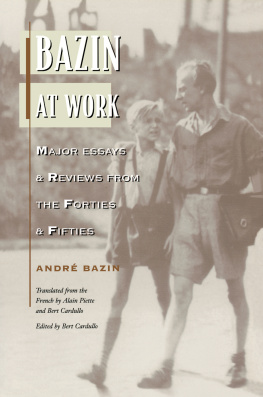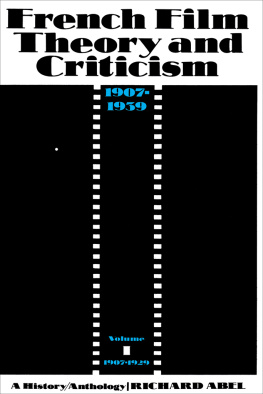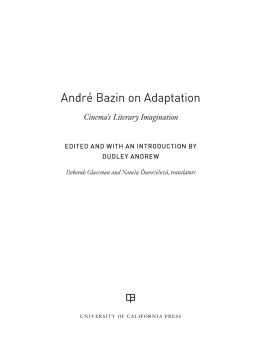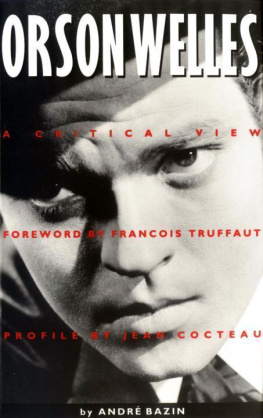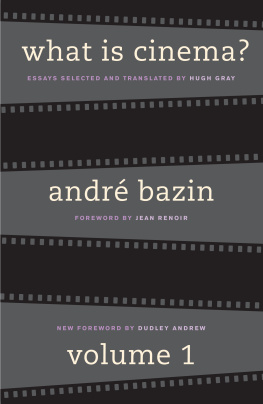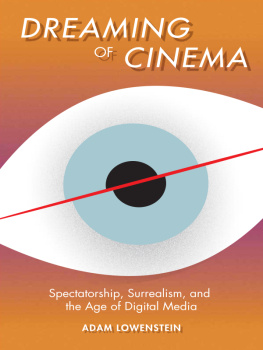Opening Bazin
Opening Bazin
Postwar Film Theory and Its Afterlife
EDITED BY
Dudley Andrew
WITH
Herv Joubert-Laurencin


Oxford University Press, Inc., publishes works that further
Oxford Universitys objective of excellence
in research, scholarship, and education.
Oxford New York
Auckland Cape Town Dar es Salaam Hong Kong Karachi
Kuala Lumpur Madrid Melbourne Mexico City Nairobi
New Delhi Shanghai Taipei Toronto
With offices in
Argentina Austria Brazil Chile Czech Republic France Greece
Guatemala Hungary Italy Japan Poland Portugal Singapore
South Korea Switzerland Thailand Turkey Ukraine Vietnam
Copyright 2011 by Oxford University Press, Inc.
Published by Oxford University Press, Inc.
198 Madison Avenue, New York, New York 10016
www.oup.com
Oxford is a registered trademark of Oxford University Press
All rights reserved. No part of this publication may be reproduced,
stored in a retrieval system, or transmitted, in any form or by any means,
electronic, mechanical, photocopying, recording, or otherwise,
without the prior permission of Oxford University Press.
Library of Congress Cataloging-in-Publication Data
Opening Bazin : postwar film theory and its afterlife / edited by Dudley Andrew; with Herv Joubert-Laurencin.
p. cm.
Includes bibliographical references and index.
ISBN 978-0-19-973388-0 (cloth : alk. paper) ISBN 978-0-19-973389-7 (pbk. : alk. paper)
1. Bazin, Andr?, 19181958Criticism and interpretation. 2. Motion picturesPhilosophy.
I. Andrew, Dudley, 1945 II. Joubert-Laurencin, Herv.
PN1998.3.B39O64 2011
791.43092dc22
[B]
2010019161
1 3 5 7 9 8 6 4 2
Printed in the United States of America
on acid-free paper
Contents
Dudley Andrew and Herv Joubert-Laurencin
1. A Bazinian Half-Century
Thomas Elsaesser
2. Cinema Across Fault Lines: Bazin and the French School of Geography
Ludovic Cortade
3. Evolution and Event in Quest-ce que le cinma?
Tom Conley
4. The Reality of Hallucination in Andr Bazin
Jean-Franois Chevrier
5. Beyond the Image in Benjamin and Bazin: The Aura of the Event
Monica DallAsta
6. Bazin as Modernist
Colin MacCabe
7. Film and Plaster: The Mold of History
Jean-Michel Frodon
8. From Bazin to Deleuze: A Matter of Depth
Diane Arnaud
9. Deconstruction avant la lettre: Jacques Derrida Before Andr Bazin
Louis-Georges Schwartz
10. Belief in Bazin
Philip Rosen
11. The World in Its Own Image: The Myth of Total Cinema
Tom Gunning
12. The Afterlife of Superimposition
Daniel Morgan
13. The Difference of Cinema in the System of the Arts
Angela Dalle Vacche
14. Malraux, Bazin, and the Gesture of Picasso
Dudley Andrew
15. Incoherent Spasms and the Dignity of Signs: Bazins Bresson
Noa Steimatsky
16. Animals: an Adventure in Bazins Ontology
Seung-hoon Jeong
17. Bazins Exquisite Corpses
Ivone Margulies
18. Rewriting the Image: Two Effects of the Future-Perfect in Andr Bazin
Herv Joubert-Laurencin
19. The Eloquent Image: The Postwar Mission of Film and Criticism
Philip Watts
20. Bazin in Combat
Antoine de Baecque
21. Bazin the Censor?
Marc Vernet
22. Waves of Crisis in French Cinema
Jeremi Szaniawski
23. Bazins Chaplin Myth and the Corrosive Lettrists
Rochelle Fack
24. Radical Ambitions in Postwar French Documentary
Steven Ungar
25. Bazin on the Margins of the Seventh Art
Grant Wiedenfeld
26. Television and the Auteur in the Late 50s
Michael Cramer
27. Andr Bazins Bad Taste
James Tweedie
28. Montage Under Suspicion: Bazins Russo-Soviet Reception
John MacKay
29. From Ripples to Waves: Bazin in Eastern Europe
Alice Lovejoy
30. Bazin in Brazil: A Welcome Visitor
Ismail Xavier
31. Bazin and the Politics of Realism in Mainland China
Cecile Lagesse
32. Japanese Readings: The Textual Thread
Kan Nozaki
33. Japanese Lessons: Bazins Cinematic Cosmopolitanism
Ryan Cook
A Binocular Preface
New Haven: Dudley Andrew
The oeuvre of Andr Bazin (April 1918November 1958) goes well beyond the particular genre of its expression, film criticism, reaching out to the full history of the twentieth century and to a variety of theories of art. As a child of the photographic revolution, cinema transformed the century it chronicled, a century of artistic modernism of which it has been the most troubling case. Bazin intuited its special place between art and history, positioning himself as a philosophical observer of the world and the worlds inhabitants seen through the screen. Never a flaneur, he was both systematic surveyor and militant cinephile, a daily critic of the hundreds of films on Paris screens during the most crucial period of this art, a man who never let a new film or a new idea escape him. Writing without interruption for fifteen years (19431958) and producing some 2,600 articles, he must be considered the sound films master-thinker and the first to register the effervescence of a cinematic modernism that began to come to prominence during his professional life. We are fifty years beyond Bazin and have entered another century. Yet rather than dreaming about him, we can dream with him, for each epoch dreams the one to follow, according to Jules Michelet. But to dream with Bazin we must delve into his oeuvre where the man still lives, opening an archive that needs to be opened out to the questions of concern to us today. Ouvrir Bazin! Let us open Andr Bazin. He has much to tell us.
We should all be ashamedI more than anyonethat it took the fiftieth anniversary of his passing to goad us into genuinely exploring Andr Bazin. Did we believe that we possessed all we needed in the collection he put together on the eve of his death? Were the fifty-two articles (twenty-six in the standard English translation) comprising Quest-ce que le cinma? sufficient to fund his brand of film theory, letting us stand him up against Eisenstein in some battle of the titans? For that is effectively what weve done for four decades. In the modest preface he composed for Quest-ce que le cinma? Bazin consigned most of his writing to ephemera, as he reviewed everyday films or ordinary moments few of which merited resurrection. However, each moment did demand that he take a position, and weve come to value those positions and learn from many of those moments. His friends and followers eventually gathered additional collections of his writing (on Renoir, on Chaplin, on Welles, on the Occupation and Liberation, on French cinema, and, most intriguingly, on The Cinema of Cruelty). Counting everything available in the various French and English anthologies brings us 204 pieces. The persistent student can locate some of these at the bookstore and all of them through diligent use of interlibrary loan. What would it be like to open up the lesser known of these articles to their history or to new interpretations? And what about the uncollected Bazin, the rests of the 2,600 pieces in the bibliography on Yales and Amiens Web sites? What would it be like to open
Next page

